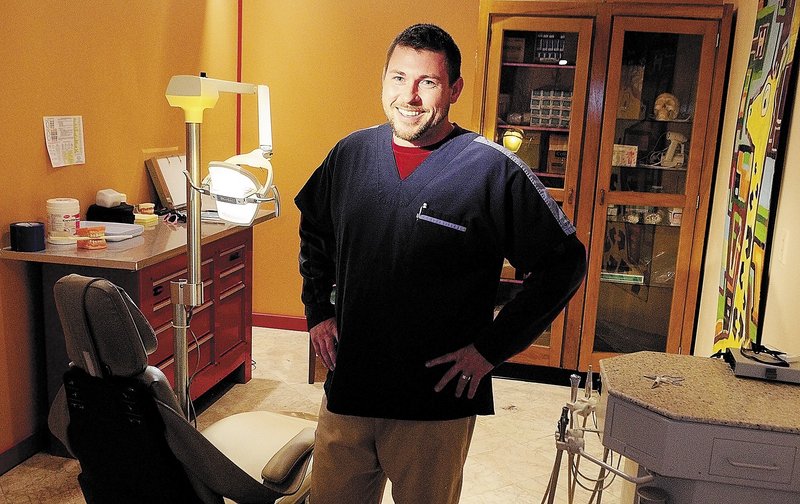Eric McMaster remembers once sticking a paper clip into a cavity as a kid because it was the only thing that made his tooth feel better.
McMaster, a dental hygienist with his own practice in Gardiner, said he sees people in similar situations — suffering with tooth decay because they can’t afford to go to a dentist.
He supports a bill probably going before the Legislature this week that would allow him to provide more services that dentists do, such as filling cavities and pulling teeth.
The bill, which has divided the dental industry in Maine, would create a new category of hygienists called dental hygiene therapists, who, after graduating from a dental therapy program, could do some procedures similar to a dentist.
House Speaker Mark Eves, D-North Berwick, said he’s sponsoring L.D. 1230 to provide greater access to dental care to children in rural parts of the state.
Eves said he expects the bill will be brought up in the House this week, with the goal of passage before the session ends on Wednesday.
Dentists have been strong opponents of the bill, saying it will give too much responsibility to a second tier of dental professionals with less training than dentists.
Others have said it fails to address problems leading to poor oral health — limited funding from MaineCare for dental services and a lack of dental education.
Dental hygienists, for the most part, have supported the bill.
McMaster said creating the midlevel practitioner degree would allow him and other independent dental hygienists to provide services to people who otherwise wouldn’t be able to afford them.
“It would definitely save them a whole lot of problems and probably save them a whole lot of teeth,” McMaster said.
He opened his downtown Gardiner business, Healthy Smiles LLC, at the end of January, and provides preventive dental care such as cleanings and sealants for significantly lower fees than dentists do.
McMaster said providing services such as fillings and extractions at lower costs than dentists would, he hopes, change the mind-set of some people who go to a dentist only if a tooth hurts.
He refers patients to low-cost clinics for additional work such as fillings, but some people can’t make the appointment because of transportation problems and being unable to take time off from work, he said.
He said most of his patients are children on MaineCare, which doesn’t cover preventive dental care for adults. Not all dentists accept children on MaineCare either, he said.
Independent-practice dental hygienists can do cleanings, fluoride treatments, sealants, temporary medicated fillings and inspections of teeth.
There are about 58 independent-practice dental hygienists in Maine, but fewer than 20 practice on their own, according to Doug Dunbar, spokesman for the state Department of Professional and Financial Regulation.
Some dental professionals oppose the dental therapists bill because they think the expansion of preventive care and education for children would be more effective at improving the state’s oral health.
Dental hygienist Susanne LaVallee has been operating a nonprofit program that provides preventive care for children in 36 schools in the area.
The Winthrop-based organization, Maine Dental Health Out-Reach Inc., travels from Jay to Richmond to do screenings and cleanings and apply sealants and temporary fillings.
She is a dental hygienist with public health supervision status, meaning she can serve in nontraditional practice settings such as schools, community centers or nursing homes.
“I’d rather see us going down a different road,” she said of the bill. “Anything’s going to help, but my focus is prevention.”
LaVallee said she probably would have supported a dental therapist license when she started her program 11 years ago, but the results of preventive work have changed her mind.
Children who have been seen by LaVallee and her program have less than 30 percent of the tooth decay found in those being seen for the first time, she said.
“It’s mind-boggling, what this program does,” LaVallee said. “This is the answer. Prevent the disease. Don’t treat it.”
Paul Koenig can be contacted at 621-5663 or at:
pkoenig@mainetoday.com
Send questions/comments to the editors.



Success. Please wait for the page to reload. If the page does not reload within 5 seconds, please refresh the page.
Enter your email and password to access comments.
Hi, to comment on stories you must . This profile is in addition to your subscription and website login.
Already have a commenting profile? .
Invalid username/password.
Please check your email to confirm and complete your registration.
Only subscribers are eligible to post comments. Please subscribe or login first for digital access. Here’s why.
Use the form below to reset your password. When you've submitted your account email, we will send an email with a reset code.